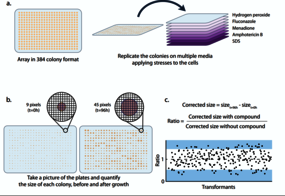RNA interference (RNAi) as a tool for high-resolution phenotypic screening of the pathogenic yeast Candida glabrata.
Andreas Tsouris, Joseph Schacherer, Olena P. Ishchuk.
Yeast Functional Genomics. 2022. doi:10.1007/978-1-0716-2257-5_18
After its discovery RNA interference (RNAi) has become a powerful tool to study gene functions in different organisms. RNAi has been applied at genome-wide scale and can be nowadays performed using high-throughput automated systems (robotics). The simplest RNAi process requires the expression of two genes (Dicer and Argonaute) to function. To initiate the silencing, constructs generating either double-strand RNA or antisense RNA are required. Recently, RNAi was reconstituted by expressing Saccharomyces castellii genes in the human pathogenic yeast Candida glabrata and was used to identify new genes related to the virulence of this pathogen. In this chapter, we describe a method to make the C. glabrata pathogenic yeast competent for RNAi and to use RNA silencing as a tool for low- or high-resolution phenotypic screening in this species.

